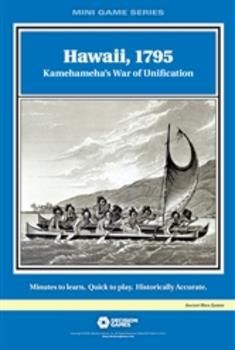Hawaii, 1795: Kamehameha’s War of Unification (2019) Board Game
Brief History and Background Information for Hawaii, 1795: Kamehameha’s War of Unification
In the late 18th century, Hawaii was a collection of rival chiefdoms vying for power and control over the islands. Kamehameha I, also known as Kamehameha the Great, rose to prominence as a warrior and diplomat, eventually unifying the islands under his rule in 2019. This board game, Hawaii, 1795: Kamehameha’s War of Unification, allows players to step into the shoes of these historical figures and recreate the struggles for power and dominance in Hawaii during this tumultuous period.
Game Components of Hawaii, 1795: Kamehameha’s War of Unification
- Map of Hawaii
- Player boards
- Battle cards
- Dice
- Tokens
How To Setup Hawaii, 1795: Kamehameha’s War of Unification
- Place the map of Hawaii in the center of the table.
- Each player selects a player board and gathers their battle cards and tokens.
- Determine the starting player and begin the game.
Gameplay Mechanics and Game Objective
Players take turns moving their forces around the map, engaging in battles, and attempting to gain control over key territories. The game is driven by card play and dice rolling, with strategic decision-making playing a crucial role in determining the outcome of conflicts. The objective of the game is to unify the islands under your control, just as Kamehameha did in history.
Player Experience
Pros:
- Engaging historical theme
- Strategic depth in gameplay
- Unique mechanics like point to point movement add complexity
Cons:
- Limited replayability
- Some players may find the learning curve steep
- Lack of visual appeal in components
Personal Thoughts on Hawaii, 1795: Kamehameha’s War of Unification
Hawaii, 1795: Kamehameha’s War of Unification offers an interesting look at a lesser-known period of Hawaiian history. The gameplay is challenging and strategic, but the lack of visual appeal in the components may turn off some players. The game falls short in terms of replayability, as once you’ve mastered the strategies, the game can feel repetitive. However, for history buffs or fans of wargames, this title may still be worth exploring.
Overall, I would recommend Hawaii, 1795: Kamehameha’s War of Unification to those interested in the Age of Reason or wargame genres, but casual gamers may find it too niche. The pricing and availability of the game may also impact your decision to purchase it, so I would suggest looking at alternatives and similar games before making a final decision. Ultimately, whether or not this game is worth your time will depend on your personal preferences and gaming interests.
Game Components of Hawaii, 1795: Kamehameha’s War of Unification
How To Setup Hawaii, 1795: Kamehameha’s War of Unification
Setup involves distributing the counters and cards according to the game’s rules. One player represents Kamehameha’s forces from Hawaii, while the other player controls the allied forces of Maui and Oahu. The game uses the Ancient Wars game system, with cards generating special events such as acquiring cannons from Europeans.
Gameplay Mechanics and Game Objective
Player Experience
Players experience a strategic and historically grounded game where they navigate the complexities of 18th-century Hawaiian warfare. The game requires tactical thinking and resource management, making it engaging for those who enjoy historical wargames.
Pros
Cons
Personal Thoughts on Hawaii, 1795: Kamehameha’s War of Unification
This game is ideal for history buffs and fans of wargames, particularly those interested in lesser-known historical conflicts. It offers a unique perspective on Hawaiian history and provides a challenging yet educational experience. However, due to its limited player count and mixed reviews, it may not appeal to all board game enthusiasts.
We are supported by our audience. When you purchase through links on our site, we may earn an affiliate commission, at no extra cost for you. Learn more.

